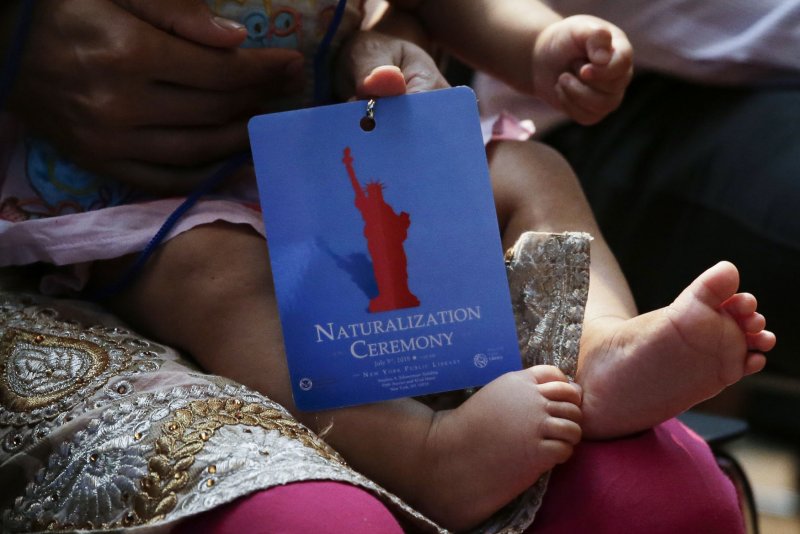A child is held by a new citizen of the United States as U.S. Citizenship and Immigration Services administers the Oath of Allegiance during a special naturalization ceremony in New York City on July 3, 2018. File Photo by John Angelillo/UPI |
License Photo
April 24 (UPI) -- A divided Supreme Court heard opening arguments Tuesday about whether the 2020 U.S. census should include the controversial question about citizenship status, a landmark case that can affect elections and federal funding for years.
The Trump administration is attempting to add the question, which has led to several legal challenges that worked their way through the lower courts before finding their way to the high court this week.
Civil rights groups and the state of New York argue the question is an "arbitrary and capricious" matter that's politically motivated to under-count people in Democratic districts, especially where there's a strong immigrant population.
Constitutionally, the census must count all persons living in the United States, regardless of their status as a citizen. The results each decade are used to create congressional districts and determine how many electoral votes states have in a presidential election.
The 2010 census gave Texas four new seats in the House and Florida gained four, while New York and Ohio lost two each. New York is the lead plaintiff in the fight against the Trump administration's citizenship question.
Arguments before the justices Tuesday reflected the controversy surrounding the question.
"I'm sorry. It's not been a part of the survey ... since 1950," Justice Sonia Sotomayor told U.S. Solicitor General Noel Francisco, who argued on behalf of the administration. "And for 65 years, every secretary of the Department of Commerce, every statistician, including [Ross'] statistician, recommended against adding the question."
"But, your honor, it has been part of the census for the better part of 200 years," Francisco replied, saying the decision "is well within [Commerce Secretary Wilbur Ross'] discretion."
"This is about 100 percent that people will answer less," Sotomayor said. "We do know that there will be less people being reported, which is the whole purpose of the survey.
"That's a maximum need of the census survey report, not citizenship."
"The question is, why is asking a question better when you know that asking a question is going to result in lots of non-responses and in lots of false reporting?" Justice Elena Kagan added -- to which Francisco answered, "having citizenship data would help improve Voting Rights Act enforcement."
Three lower courts have struck down the citizenship question, saying it was ordered without careful study and public comment.
Justice Brett Kavanaugh, the newest member of the court, said countries including Spain, Germany, Mexico, Canada and Ireland ask a similar question and it's a recommendation from the United Nations. The question was on the U.S. census until 1950, he said, and some U.S. households received census questionnaires that included the question until 2000.
California attorney general Xavier Beccera said the census is critical for his state.
"An undercount would threaten at least one of California's seats in the House of Representatives -- and, by extension, an elector in the electoral college," Beccera said. "It would deprive California and its cities and counties of their fair share of billions of dollars in federal funds."
"The Secretary decided to add this question about citizenship to the 2020 census, although the record before him contained uncontradicted and strong evidence that it will cause a decline in the response rate," New York Attorney General Barbara Underwood said, arguing against the question.
Conservative justices Samel Alito and Neil Gorusch argued there are other reasons non-citizens wouldn't respond to the census, other than the fact that it asks about their legal status. There could socioeconomic differences and a language barrier that could factor into them not turning in a census, Alito said.
Others might think the questionnaire is too long and won't have time to fill it out, Gorsuch said.
Justice Ruth Bader Ginsburg argued against the question, but also pointed out Congress has been aware of its addition and hasn't done anything to stop it. In the past, Congress on occasion has nixed questions asking about religion on the census.
Administration officials have urged the court to rule in a timely manner on the issue, as it must begin preparing census paperwork by the summer.















